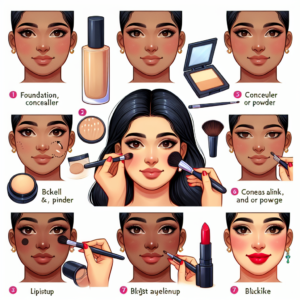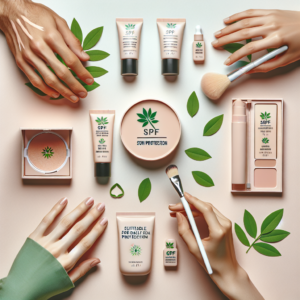
When it comes to choosing makeup, especially if you have sensitive skin, it’s not just about the shade or the staying power. It’s about ensuring your skin is nurtured and protected, which is where vegan makeup comes into play. Vegan makeup products, which are free from animal-derived ingredients, can be particularly beneficial for those with sensitive skin because they often contain fewer irritants. But not all vegan makeup is created equal, so let’s dive into what you need to know to make the best choices for your skin.
Key Takeaways
-
Vegan makeup is often gentler on sensitive skin because it’s free from common irritants found in animal-derived ingredients.
-
Always check for harmful ingredients like parabens, phthalates, and synthetic fragrances, which can trigger sensitive skin reactions.
-
Look for makeup products that include SPF protection to shield your skin from harmful UV rays.
-
Hypoallergenic vegan makeup products are formulated to minimize the risk of allergic reactions and skin irritation.
-
Understanding product labels is key to avoiding ingredients that could cause discomfort or harm to your sensitive skin.
Choosing the Right Vegan Makeup for Sensitive Skin
For those of us with sensitive skin, every ingredient matters. The right vegan makeup will respect your skin’s needs, avoiding harsh chemicals and unnecessary additives. A simple rule of thumb is to seek out products with a short and understandable ingredients list. Besides that, it’s crucial to be vigilant about what you apply to your skin. Just because a product is labeled as ‘vegan’ doesn’t automatically mean it’s suitable for sensitive skin. It’s important to do your homework and know what to look for—and what to avoid.
Why Vegan Makeup is a Game-Changer for Sensitive Skin
Vegan makeup is often celebrated for its ethical stance, but it also offers tangible benefits for sensitive skin. The absence of animal-derived ingredients means you’re less likely to encounter the hormones, allergens, and other skin irritants these can contain. Furthermore, many vegan makeup brands are committed to using natural, plant-based components that are kinder to the skin. This can be a real game-changer, as plant-based ingredients are more likely to soothe and heal rather than provoke your skin.
Top Ingredients to Avoid in Makeup for Sensitive Skin
When scanning the labels of vegan makeup, there are some notorious ingredients you should steer clear of:
-
Parabens: Often used as preservatives, these can disrupt hormone function and irritate sensitive skin.
-
Phthalates: These chemicals are linked to a host of health issues and can be particularly harsh on delicate skin.
-
Synthetic fragrances: A common cause of allergic reactions, they can lead to irritation and other skin woes.
Remember, it’s not just about what’s in your makeup; it’s also about what’s not in it. Vegan makeup for sensitive skin should be free from these culprits to help keep your skin calm and clear.
How Hypoallergenic Products Benefit Sensitive Skin
Hypoallergenic products are like a breath of fresh air for sensitive skin. They’re specifically formulated to reduce the risk of allergic reactions and skin irritation. This doesn’t mean they’re allergy-proof, but they contain fewer allergens than typical makeup products. When you opt for hypoallergenic vegan makeup, you’re choosing products that prioritize your skin’s health and comfort. They’re often gentler, with a focus on simplicity and purity in their ingredient list. It’s a proactive step towards avoiding those pesky skin flare-ups.
Reading Labels: A Guide to Safe Ingredients

Understanding the labels on your makeup is crucial for keeping your sensitive skin safe. You need to become a bit of a detective, looking beyond the marketing jargon to the real substance of what’s inside. It’s about recognizing which ingredients are friends and which are foes to your skin. By educating yourself on this, you’ll be able to make informed choices that go beyond the surface appeal of the product.
Here’s a tip: if you can’t pronounce it or don’t know what it is, take a moment to look it up. Knowledge is power, especially when it comes to protecting your skin.
Deciphering Cosmetic Labels for Sensitive Skin Safety
When you’re perusing the cosmetic aisle, keep an eye out for labels that list ingredients like aloe vera, chamomile, and green tea—natural components known for their soothing properties. And don’t be fooled by the word ‘fragrance’—it’s often a catch-all for hidden chemicals that can be harsh on sensitive skin. Transparency in labeling is key, so choose brands that lay all their cards on the table.
Common Irritants in Makeup to Watch Out For
Here’s a quick hit list of common irritants that sensitive skin generally doesn’t tolerate well:
-
Alcohol: Can be very drying and stripping for sensitive skin types.
-
Artificial dyes: These can lead to skin irritation and are unnecessary for product efficacy.
-
Sulfates: Known to strip skin of its natural oils, leading to dryness and irritation.
By avoiding these ingredients, you’re likely to keep your skin in a happier, healthier state.
Recommended Vegan Makeup Brands for Sensitive Skin
Now that you’re armed with knowledge, it’s time to talk about where to find these skin-friendly products. There are several standout brands that cater to the needs of sensitive skin with their vegan makeup lines.
Top Picks for Foundation and Concealer
When it comes to foundation and concealer, look for brands that offer a range of options to cater to different sensitive skin concerns. Brands like ILIA and Cover FX provide products with minimal ingredients and avoid common irritants, ensuring that your skin gets coverage without compromise.
Gentle Eye Makeup Options
The skin around your eyes is particularly delicate, so it’s essential to choose eye makeup that’s gentle. Brands like Ecco Bella and Pacifica offer vegan mascara and eyeshadows that are kind to sensitive eyes, so you can enhance your look without irritation.
Remember, just because a product is vegan doesn’t mean it’s automatically good for sensitive skin. You still need to check the ingredients and test the product on a small patch of skin if possible.
Sensitive Skin-Friendly Lip Products
For lip products, brands like Axiology and Bite Beauty are excellent choices as they use natural oils and waxes that provide moisture without the use of animal-derived ingredients. Their lipsticks and balms offer both color and care, keeping your lips soft and supple.
So there you have it, a guide to navigating the world of vegan makeup for sensitive skin. By staying informed and choosing wisely, you can enjoy the beauty of makeup without the worry of skin irritation. Happy shopping!
FAQ
What Does ‘Vegan Makeup’ Actually Mean?
Vegan makeup means that the product does not contain any animal-derived ingredients or byproducts. This includes common ingredients like beeswax, lanolin, collagen, and carmine. Instead, vegan makeup uses plant-based or synthetic alternatives to provide the same effectiveness without using animal products. It’s important for ethical consumers, but also for those with sensitive skin, as these ingredients can sometimes cause irritation or allergic reactions.
Can Vegan Makeup Still Cause Allergic Reactions?
Yes, vegan makeup can still cause allergic reactions. Being vegan does not automatically make a product hypoallergenic. Allergies are specific to individuals and can be triggered by a variety of ingredients, whether they are derived from animals or plants. If you have sensitive skin, it’s essential to look for makeup that is both vegan and hypoallergenic to minimize the risk of a reaction.
How Often Should I Apply SPF Makeup Throughout the Day?
SPF makeup is a great way to protect your skin from the sun’s harmful UV rays, but it’s not a one-and-done deal. You should reapply every two hours, especially if you’re spending time outdoors, sweating, or swimming. This will ensure that your skin remains protected throughout the day. Remember, UV exposure can happen even on cloudy days, so don’t skip the SPF!
What Makes a Product Hypoallergenic?
A product is hypoallergenic when it’s formulated to minimize the risk of allergic reactions. Hypoallergenic makeup products typically avoid ingredients that are known allergens or irritants. However, there’s no regulated standard for what constitutes a hypoallergenic product, so it’s still important to review ingredient lists and patch-test new products whenever possible.
Are There Vegan Makeup Options for Very Reactive Skin?
Absolutely! There are many vegan makeup options available for those with very reactive skin. Brands are increasingly aware of the need for gentle formulas that cater to all skin types. Look for products labeled as ‘for sensitive skin’ or ‘dermatologist-tested’ in addition to being vegan. These products are more likely to exclude common irritants and focus on soothing ingredients.




